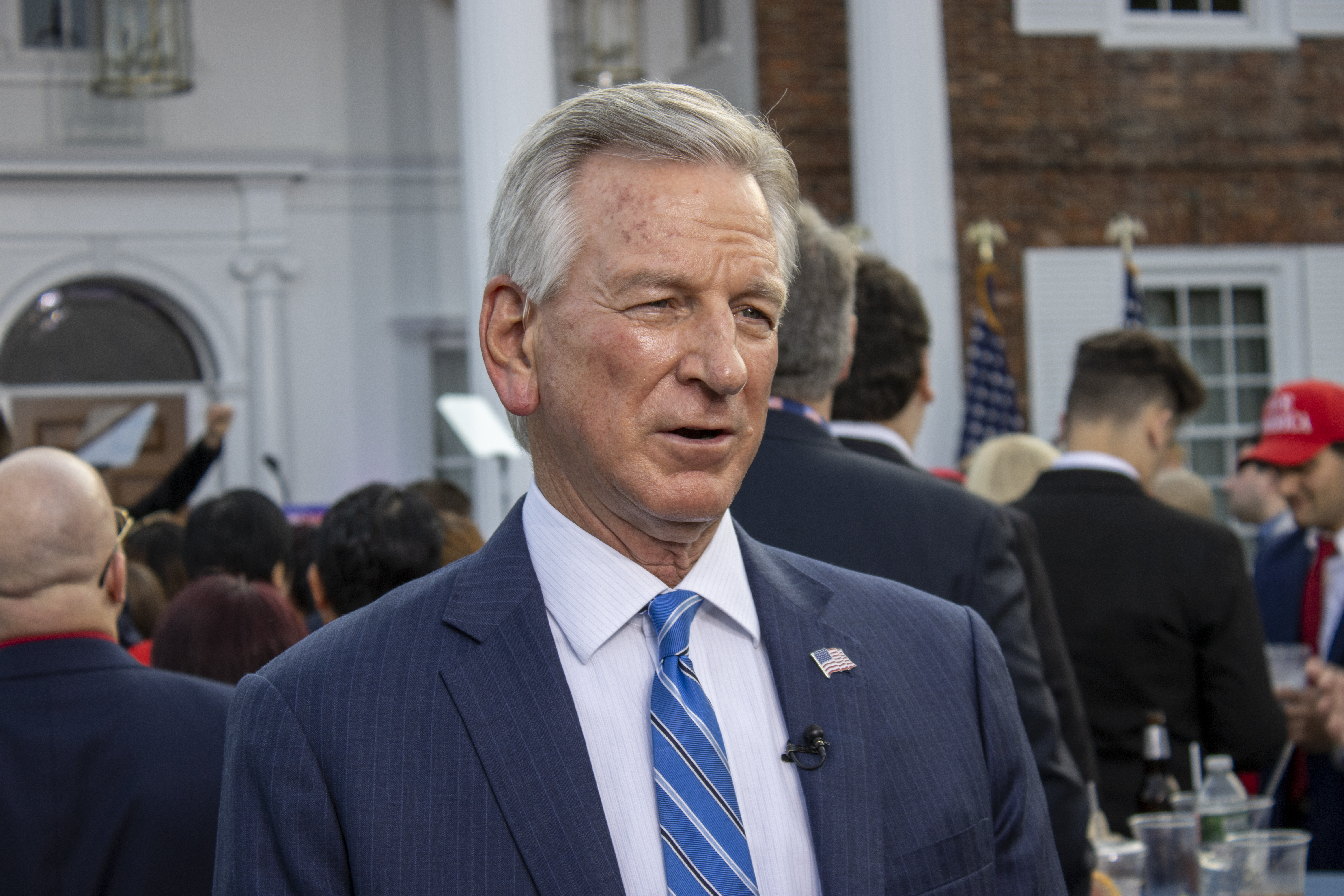
FILE – Sen. Tommy Tuberville, R-Ala., listens during the Senate Armed Services Committee hearing on July 12, 2023, on Capitol Hill in Washington.
Alabama Sen. Tommy Tuberville is waging an unprecedented campaign to try to change Pentagon abortion policy by holding up hundreds of military nominations and promotions, forcing less experienced leaders into top jobs and raising concerns at the Pentagon about military readiness.
Senators in both parties — including Republican Leader Mitch McConnell — have pushed back on Tuberville’s blockade, but Tuberville is dug in. He says he won’t drop the holds unless majority Democrats allow a vote on the policy.
For now, the fight is at a stalemate. Democrats say a vote on every nominee could tie up the Senate floor for months. And they don’t want to give in to Tuberville’s demands and encourage similar blockades of nominees in the future.
Get top local stories in Philly delivered to you every morning. Sign up for NBC Philadelphia's News Headlines newsletter.
Senate Majority Leader Chuck Schumer has said that holding up the promotion of military leaders, most of whom have dedicated their lives to protecting the country, “is one of the most abominable and outrageous things I have ever seen in this chamber, witnessed by the fact that no one has ever had the temerity, the gall to do this before.”
Here's what to know about the clash over Pentagon policy.
Approving military nominations and promotions has long been one of the most bipartisan duties of the Senate. But the Alabama Republican shattered that norm with his blanket hold, which the Pentagon says has already stalled more than 260 nominations of senior officers and could balloon to 650 by the end of the year.
Tuberville, a former college football coach who has closely aligned himself with former President Donald Trump since he was elected in 2020, has showed few signs of letting up.
Democrats have repeatedly gone to the Senate floor to try and call up the nominations. But Tuberville has objected each time.
Tuberville says he won’t drop the holds until there is a vote on the Pentagon policy. But he hasn’t introduced legislation to overturn it and insists that debate on amendments to change the policy wouldn’t count.
Instead, he has proposed a very specific, unusual strategy: Democrats should introduce their own bill on the policy and hold a vote.
Democratic leaders such as Schumer, who support the existing policy, say it's up to the GOP.
“The onus is on Republican senators to prevail on Senator Tuberville and get him to back off his reckless pursuit,” Schumer said this week.
In the Senate, one senator can hold up nominations or legislation even if the other 99 want it to move forward.
Generally, leaders in the majority party get around this by holding a series of votes to move a measure and dispense of the hold. It just takes some additional time on the Senate floor.
But Tuberville’s blockade is unique because there are hundreds of military nominations and promotions, and Democratic leaders would have to hold roll call votes on every single one of them to get around the hold. It’s a decades-long tradition for the Senate to group military promotions together and approve them by voice vote, avoiding lengthy roll calls.
So Tuberville has put the Senate in a bind. The chairman of the Senate Armed Services Committee, Sen. Jack Reed, D-R.I., said this week that voting on the more than 260 military nominations through the regular procedure would take 27 days with the Senate working “around the clock” or 84 days if the Senate worked eight hours a day.
In addition to hundreds of one-, two- and three- star generals and admirals, the holds delay the confirmation of the Pentagon’s top leaders — who make up the Joint Chiefs of Staff, including the chairman.
Already, the U.S. Marine Corps is without a confirmed leader for the first time in a century. And by law, the current Joint Chiefs chairman, Army Gen. Mark Milley, will step down at the end of September, and the current Army chief will leave his post in early August. The nominees to succeed them have hadhearings, but no votes.
The Pentagon and lawmakers opposed to Tuberville’s actions say the holds create a trickle-down effect that is hurting military readiness, preventing scores of officers from moving to new jobs, either as nominees or staff members. They argue that less experienced leaders are being forced to step in.
Speaking this week about the acting commandant of the U.S. Marine Corps, Gen. Eric Smith, Tuberville says he believes the holds will have “minimal effect” on his ability to lead in an acting capacity.
“There may be a delay in his planning guidance, and yet he cannot move into the commandant’s residence, but there is little doubt about General Smith’s ability to lead effectively,” Tuberville said.
After the Supreme Court overturned the nationwide right to abortion, Defense Secretary Lloyd Austin issued new policy last October that he said would ensure all troops have access to reproductive health care.
In a memo, Austin said service members and their families were worried they may not get equal access to health care, including abortions. And as many states began to impose more abortion restrictions, he noted that service members who often must move for various missions or training would be forced to travel further, take more time off work and pay more to access reproductive health care.
The problem, Austin said, would create extraordinary hardship and “will interfere with our ability to recruit, retain, and maintain the readiness of a highly qualified force.”
He ordered the department to allow troops and dependents, consistent with federal law, to take time off and use official travel to get to other states for reproductive care not available locally. That care includes in vitro fertilization and other pregnancy aids that also may not be accessible close by.
The policy does not fund abortions. Under federal law, Defense Department facilities can perform abortions only when the life of the mother is at risk or in cases of rape or incest, and those instances have been extremely rare. According to the department, there were 91 abortions performed in military medical facilities between 2016 and 2021.
The impasse in confirmations fueled sharp debates this week during Senate Armed Services Committee hearings. A parade of lawmakers also took to the Senate floor to complain.
At a hearing this week for Air Force Gen. CQ Brown Jr., Biden’s pick to replace Milley as the next Chairman of the Joint Chiefs of Staff, Sen. Tim Kaine warned that service members may choose to leave the military if they see their careers blocked.
“I would urge all of my colleagues to turn away from the path that we’re on where we are disrespecting and punishing people because we’re unhappy with policies in the military that these individuals had nothing to do with,” said Kaine, D-Va.
Tuberville has faced opposition from his side of the aisle, as well.
McConnell said in May that he opposes Tuberville’s blockade. And several Republican senators said this week that they were hoping to find a way to persuade the senator to drop the holds.
“I think all of us are concerned — we want to get these key positions filled,” said South Dakota Sen. John Thune, the No. 2 Senate Republican.
In the House, Republicans passed a wide-ranging defense bill on Friday that would reverse the new abortion policy. But Tuberville has said that’s not enough to get him to drop the holds.
Austin called Tuberville on Friday to discuss the holds, shortly after President Joe Biden told reporters that Tuberville is jeopardizing national security and being “ totally irresponsible.”
Through a spokeswoman, Tuberville said he was “grateful” for the call and he would discuss the matter with Austin again next week.
It’s unclear, though, if they can find compromise. Tuberville has said repeatedly that he will keep his hold until there is a vote.
“We need a vote on this policy on the floor,” he said Wednesday. “I don’t know whether it would pass. It may. I don’t care. I just want the American people to have a say-so in this, not the Pentagon.”



